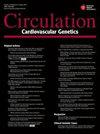Sucrose Nonfermenting-Related Kinase Enzyme–Mediated Rho-Associated Kinase Signaling is Responsible for Cardiac Function
Q Medicine
引用次数: 12
Abstract
Background—Cardiac metabolism is critical for the functioning of the heart, and disturbance in this homeostasis is likely to influence cardiac disorders or cardiomyopathy. Our laboratory has previously shown that SNRK (sucrose nonfermenting related kinase) enzyme, which belongs to the AMPK (adenosine monophosphate–activated kinase) family, was essential for cardiac metabolism in mammals. Snrk global homozygous knockout (KO) mice die at postnatal day 0, and conditional deletion of Snrk in cardiomyocytes (Snrk cmcKO) leads to cardiac failure and death by 8 to 10 months. Methods and Results—We performed additional cardiac functional studies using echocardiography and identified further cardiac functional deficits in Snrk cmcKO mice. Nuclear magnetic resonance-based metabolomics analysis identified key metabolic pathway deficits in SNRK knockdown cardiomyocytes in vitro. Specifically, metabolites involved in lipid metabolism and oxidative phosphorylation are altered, and perturbations in these pathways can result in cardiac function deficits and heart failure. A phosphopeptide-based proteomic screen identified ROCK (Rho-associated kinase) as a putative substrate for SNRK, and mass spec-based fragment analysis confirmed key amino acid residues on ROCK that are phosphorylated by SNRK. Western blot analysis on heart lysates from Snrk cmcKO adult mice and SNRK knockdown cardiomyocytes showed increased ROCK activity. In addition, in vivo inhibition of ROCK partially rescued the in vivo Snrk cmcKO cardiac function deficits. Conclusions—Collectively, our data suggest that SNRK in cardiomyocytes is responsible for maintaining cardiac metabolic homeostasis, which is mediated in part by ROCK, and alteration of this homeostasis influences cardiac function in the adult heart.蔗糖非发酵相关激酶酶介导的rho相关激酶信号通路与心功能有关
背景:心脏代谢对心脏功能至关重要,这种体内平衡的紊乱可能会影响心脏疾病或心肌病。我们的实验室之前已经证明,SNRK(蔗糖非发酵相关激酶)酶,属于AMPK(单磷酸腺苷活化激酶)家族,对哺乳动物的心脏代谢至关重要。Snrk全球纯合敲除(KO)小鼠在出生后第0天死亡,心肌细胞中Snrk的条件缺失(Snrk cmcKO)导致心力衰竭和8至10个月死亡。方法和结果:我们使用超声心动图进行了额外的心功能研究,并在Snrk cmcKO小鼠中发现了进一步的心功能缺陷。基于核磁共振的代谢组学分析在体外鉴定了SNRK敲低心肌细胞的关键代谢途径缺陷。具体来说,参与脂质代谢和氧化磷酸化的代谢物被改变,这些途径的扰动可导致心功能缺陷和心力衰竭。基于磷酸化肽的蛋白质组学筛选发现ROCK (rho相关激酶)可能是SNRK的底物,基于质谱的片段分析证实了ROCK上的关键氨基酸残基被SNRK磷酸化。Western blot分析Snrk cmcKO成年小鼠和Snrk敲除心肌细胞的心脏裂解液显示ROCK活性增加。此外,体内抑制ROCK部分挽救了体内Snrk cmcKO心功能缺陷。结论:总的来说,我们的数据表明心肌细胞中的SNRK负责维持心脏代谢稳态,这部分是由ROCK介导的,而这种稳态的改变会影响成人心脏的功能。
本文章由计算机程序翻译,如有差异,请以英文原文为准。
求助全文
约1分钟内获得全文
求助全文
来源期刊

Circulation-Cardiovascular Genetics
CARDIAC & CARDIOVASCULAR SYSTEMS-GENETICS & HEREDITY
CiteScore
3.95
自引率
0.00%
发文量
0
期刊介绍:
Circulation: Genomic and Precision Medicine considers all types of original research articles, including studies conducted in human subjects, laboratory animals, in vitro, and in silico. Articles may include investigations of: clinical genetics as applied to the diagnosis and management of monogenic or oligogenic cardiovascular disorders; the molecular basis of complex cardiovascular disorders, including genome-wide association studies, exome and genome sequencing-based association studies, coding variant association studies, genetic linkage studies, epigenomics, transcriptomics, proteomics, metabolomics, and metagenomics; integration of electronic health record data or patient-generated data with any of the aforementioned approaches, including phenome-wide association studies, or with environmental or lifestyle factors; pharmacogenomics; regulation of gene expression; gene therapy and therapeutic genomic editing; systems biology approaches to the diagnosis and management of cardiovascular disorders; novel methods to perform any of the aforementioned studies; and novel applications of precision medicine. Above all, we seek studies with relevance to human cardiovascular biology and disease. Manuscripts are examined by the editorial staff and usually evaluated by expert reviewers assigned by the editors. Both clinical and basic articles will also be subject to statistical review, when appropriate. Provisional or final acceptance is based on originality, scientific content, and topical balance of the journal. Decisions are communicated by email, generally within six weeks. The editors will not discuss a decision about a manuscript over the phone. All rebuttals must be submitted in writing to the editorial office.
 求助内容:
求助内容: 应助结果提醒方式:
应助结果提醒方式:


